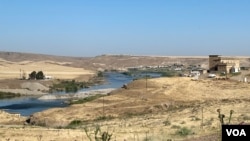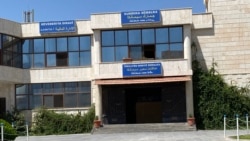A vital border crossing between Iraq’s Kurdistan Region and Syria’s northeast remains closed one week after violent clashes broke out between supporters of a major Syrian Kurdish party and border guards on the Iraqi side.
On December 15, protesters affiliated with the Democratic Union Party (PYD), the de facto ruling party in northeast Syria, clashed with security forces of the Kurdistan Regional Government (KRG) near the Fishkhabour-Semalka border crossing. The incident prompted Iraqi Kurdish authorities to close the border point indefinitely.
In addition to preventing the movement of travelers, the border shutdown has interrupted the transportation of commodities into northeast Syria, prompting fears it could cause a shortage of basic supplies in Syria. This border crossing is the only outlet that connects northeast Syria to the world.
'Significant impact'
According to the European Civil Protection and Humanitarian Aid Operations (ECHO), several shipments of essential supplies are stuck at the border.
“The closure of the Fishkhabour-Semalka border crossing risks having a significant impact on the humanitarian operation in northeast Syria assisting 1.8 million people,” ECHO said in a statement on Wednesday.
The aid organization added that it “will continue advocating for humanitarian exemptions to allow lifesaving commodities to be sent to Syria and to facilitate the movement of international aid workers in and out of Syria.”
The KRG said it would open another border crossing with Syria on Thursday to allow international aid workers to leave Syria.
Syrian Kurdish officials said they weren’t formally notified by their counterparts on the Iraqi side about the decision to close the Fishkhabour-Semalka border crossing or the border crossing the KRG said it would open Thursday.
“They haven’t reached us formally about this closure,” Rodi Amin, head of the border crossings bureau at the Autonomous Administration in North and East Syria, told VOA. “The border remains open on our side, and we hope that [the KRG] would open the crossing for everyone, not only for international [nongovernmental organizations] workers.”
Amin added that hundreds of Syrian Kurds who hold European passports were also stranded in northeast Syria because of the closure.
A KRG spokesman didn’t respond to a VOA request for comment.
Other closings
Since its opening in 2013, the Fishkhabour-Semalka border crossing over the Tigris River has been closed several times, often because of political disputes between the two sides.
Last week’s clashes at the border, which reportedly wounded six Iraqi Kurdish guards, came after Syrian Kurdish protesters demanded the KRG hand over the bodies of four Syrian Kurdish fighters who were killed in a recent Turkish strike in northern Iraq. Some Iraq-based Kurdish fighters affiliated with the Kurdistan Workers’ Party (PKK) are Syrian nationals.
Iraqi Kurdish officials said they didn't have any information about those slain fighters, according to the Irbil-based Rudaw news network.
Analysts said the politicization of the border issue harms only civilians in war-torn Syria.
"The two sides should solve their differences through diplomatic channels,” said Zara Saleh, a Kurdish political analyst in London.
“This border crossing essentially provides a lifeline to the people on the Syrian side who have been suffering from a decadelong conflict, so ethically it should never be exploited for political gain,” he told VOA.
The KRG said it wouldn't open the crossing until Syrian Kurdish authorities gave guarantees that such attacks wouldn't happen in the future, Rudaw TV reported Tuesday.
VOA’s Zana Omer contributed to this report from Qamishli, Syria. This story originated in VOA’s Kurdish Service.





